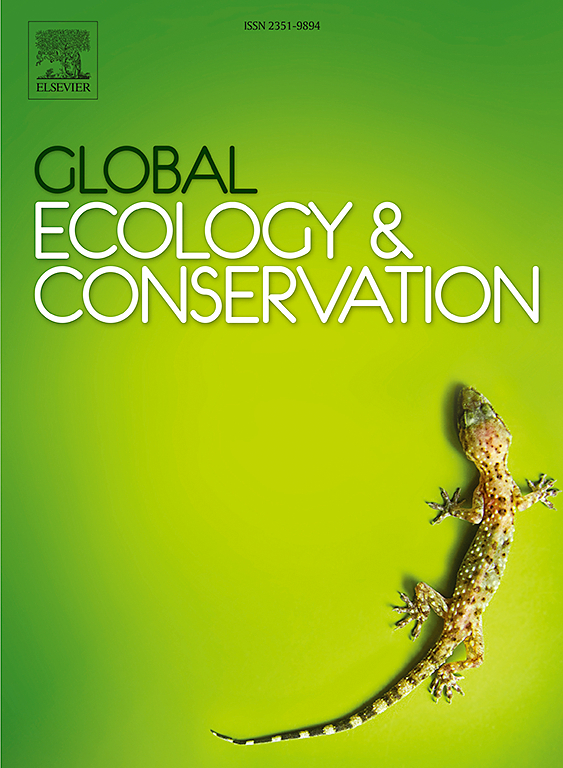Before and beyond the pandemic: Dynamics of illegal marine wildlife trade in Southern China amidst policy shifts and enforcement efforts
IF 3.4
2区 环境科学与生态学
Q1 BIODIVERSITY CONSERVATION
引用次数: 0
Abstract
This study examines the illegal marine wildlife trade in Southern China, focusing on sea turtles, giant clams, and corals, to assess enforcement challenges, market dynamics, and consumer behaviors. Adopting a multi-method approach, it incorporates a comprehensive policy and regulatory review spanning 1979–2022, along with market and consumer surveys conducted before and after the COVID-19 pandemic. Standardized training protocols were used for data collection, including consumer questionnaires and stakeholder interviews with a diverse range of actors. Market surveys reveal a 17.06 % decrease in the number of shops selling marine wildlife products but a 32.72 % increase in items available for sale, suggesting a concentration of trade activity. Consumer data indicate that the majority of potential buyers were aged 23–30 (38.93 %) and 31–45 (24.83 %), with 60 % identifying as female. Stakeholder interviews identify distinct supply chain nodes facilitating illegal trade across the region. Despite policy reforms and intensified enforcement at the onset of the COVID-19 pandemic, the study finds that marine species remain vulnerable due to fragmented regulations and inconsistent enforcement across jurisdictions. Sellers continue to exploit short-term, top-down enforcement gaps, maintaining illicit trade flows and meeting persistent consumer demand. The findings underscore the resilience of illegal trade networks and the inadequacy of reactive enforcement strategies. A multi-stakeholder approach—grounded in inter-agency coordination and civic engagement—is essential. Without sustained, community-driven enforcement mechanisms, policy efforts will remain ineffective, exacerbating illegal trade and accelerating biodiversity loss in China and the wider Global South.
疫情前后:政策转变和执法力度下中国南方非法海洋野生动物贸易的动态
本研究考察了中国南方的非法海洋野生动物贸易,重点是海龟、巨蛤和珊瑚,以评估执法挑战、市场动态和消费者行为。该报告采用多方法方法,包括对1979-2022年期间的全面政策和监管审查,以及在2019冠状病毒病大流行前后进行的市场和消费者调查。标准化培训协议用于数据收集,包括消费者问卷调查和利益相关者与各种行为者的访谈。市场调查显示,销售海洋野生动物产品的商店数量减少了17.06% %,但可供销售的商品数量增加了32.72% %,这表明贸易活动集中。消费者数据显示,大多数潜在买家年龄在23-30岁(38.93 %)和31-45岁(24.83 %),其中60% %为女性。利益相关者访谈确定了促进整个地区非法贸易的不同供应链节点。尽管在2019冠状病毒病大流行开始时进行了政策改革并加强了执法,但研究发现,由于各司法管辖区的法规不统一和执法不一致,海洋物种仍然很脆弱。卖家继续利用短期的、自上而下的执法漏洞,维持非法贸易流动,满足持续的消费者需求。调查结果强调了非法贸易网络的复原力和反应性执法战略的不足。以机构间协调和公民参与为基础的多方利益攸关方方法至关重要。如果没有持续的、社区驱动的执法机制,政策努力将仍然无效,加剧非法贸易,加速中国和更广泛的南方国家生物多样性的丧失。
本文章由计算机程序翻译,如有差异,请以英文原文为准。
求助全文
约1分钟内获得全文
求助全文
来源期刊

Global Ecology and Conservation
Agricultural and Biological Sciences-Ecology, Evolution, Behavior and Systematics
CiteScore
8.10
自引率
5.00%
发文量
346
审稿时长
83 days
期刊介绍:
Global Ecology and Conservation is a peer-reviewed, open-access journal covering all sub-disciplines of ecological and conservation science: from theory to practice, from molecules to ecosystems, from regional to global. The fields covered include: organismal, population, community, and ecosystem ecology; physiological, evolutionary, and behavioral ecology; and conservation science.
 求助内容:
求助内容: 应助结果提醒方式:
应助结果提醒方式:


